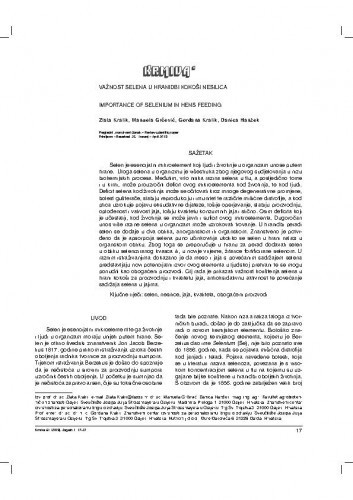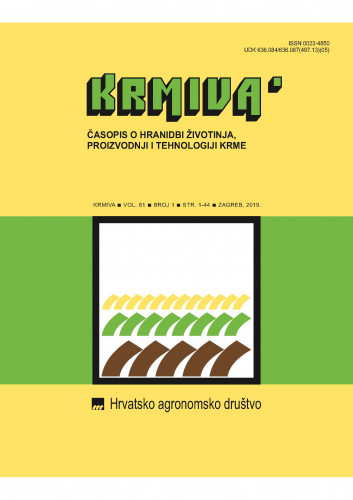Selen je esencijalni mikroelement koji ljudi i životinje u organizam unose putem hrane. Uloga selena u organizmu je višestruka zbog njegovog sudjelovanja u nizu biokemijskih procesa. Međutim, vrlo niska razina selena u tlu, a posljedično tome i u krmi, može prouzročiti deficit ovog mikroelementa kod životinja, te kod ljudi. Deficit selena kod životinja može se očitovati kroz mnoge degenerativne promjene, bolest gušterače, slabiju reprodukciju i imunitet te različite mišićne distrofije, a kod ptica uzrokuje pojavu eksudativne dijateze, lošije operjavanje, slabiju proizvodnju, oplođenost i valivost jaja, lošiju kvalitetu konzumnih jaja i slično. Osim deficita koji je učestaliji, kod životinja se može javiti i suficit ovog mikroelementa. Dugoročan unos više razine selena u organizam može uzrokovati trovanje. U hranidbi peradi selen se dodaje u dva oblika, anorganskom ili organskom. Znanstveno je potvrđeno da je apsorpcija selena puno učinkovitija ukoliko se selen u hrani nalazi u organskom obliku. Zbog toga se preporučuje u hranu za perad dodavati selen u obliku seleniziranog kvasca ili, u novije vrijeme, žitarice fortificirane selenom. U raznim istraživanjima dokazano je da meso i jaja s povećanim sadržajem selena predstavljaju novi potencijalni izvor ovog elementa u ljudskoj prehrani te se mogu ponuditi kao obogaćeni proizvodi. Cilj rada je prikazati važnost korištenja selena u hrani kokoši za proizvodnju i kvalitetu jaja, antioksidativnu aktivnost te povećanje sadržaja selena u jajima.; Selenium is an essential trace element that humans and animals must take into the body through food. The role of selenium in the body is multiple due to its participation in a number of biochemical processes. However, a very low level of selenium in the soil, and consequently in feed, may be the cause of selenium deficiency in animals and in humans. Selenium deficiency in animals can be manifested through many degenerative changes, pancreatic disease, worse reproductive and immune responses, and various muscular dystrophy, and in birds it causes exudative diathesis, poorer feathering, lower production, fertilization and hatchability of eggs, poorer quality of table eggs and the like. In addition to the deficiency, which is more common in animals, the surplus of this microelement may also occur. Long-term intake of high levels of selenium into body can cause poisoning. In poultry feeding selenium is added in two forms, inorganic or organic. It is scientifically proven that selenium absorption is much more effective if selenium is in organic form. Therefore it is recommended to add selenium yeast or, more recently, selenium fortified cereals in poultry feed. Various researches have proven that meat and eggs with higher selenium content represent a new potential source of this element in the human diet and can be offered as enriched products. The aim of this paper is to present the importance of selenium on production and egg quality, antioxidant activity and increase of selenium content in eggs.
Sažetak

 Krmiva : časopis o hranidbi životinja, proizvodnji i tehnologiji krme = [review for animal feeding, production and feed technology] : 61,1(2019) / glavni i odgovorni urednik, editor-in-chief Zlatko Janječić.
Krmiva : časopis o hranidbi životinja, proizvodnji i tehnologiji krme = [review for animal feeding, production and feed technology] : 61,1(2019) / glavni i odgovorni urednik, editor-in-chief Zlatko Janječić.